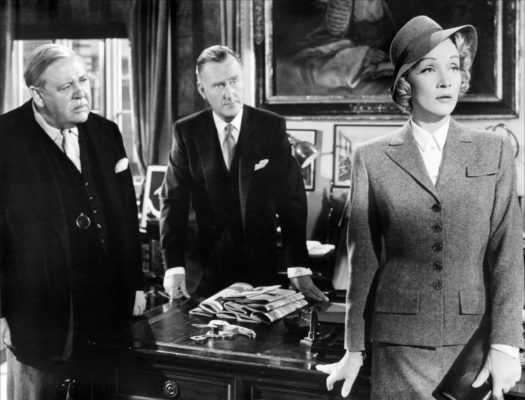Available on Blu-ray from Mon 10 Sep 2018
A middle-aged woman murdered. A broke American who stands to inherit her fortune charged. A renowned barrister persuaded to act as defence despite being in recovery from a severe bout of ill-health. The German wife of the accused who is surprisingly called as the witness for the prosecution. Billy Wilder’s adaptation of Agatha Christie‘s celebrated play is a cynical, twisty and frequently very funny courtroom drama that still shimmers even among Wilder’s unparalleled work.
Interestingly, it takes some time to make it to court. We’re first introduced to barrister Sir Wilfred Robarts (Charles Laughton) in his offices, where a solicitor friend convinces him to take the case of Leonard Vole (Tyrone Power), charged with murder. Robarts also meets Vole’s glamorous older wife Christine (Marlene Dietrich), who is at first thought to be providing an alibi. This canny scripting allows for all necessary exposition to take place while simultaneously establishing the characters. The viewer is given a feel for the guilt or otherwise of Vole, as well as the demeanour and character of Robarts before they’re hurled into the crucible of a courtroom. Once we’re at the Old Bailey, things get even better.
Power and Dietrich are excellent as a Machiavellian husband and wife who quite frankly deserve each other, but Witness for the Prosecution belongs to Laughton. This is not just for his courtroom performance, authoritative with a twinkle of subversive mischief; but for his gloriously cantankerous yet affectionate verbal duelling with his nurse Miss Plimsoll, played by Elsa Lanchester who was of course Laughton’s wife. Laughton plays it big, but it fits the outlandish narrative which marries Christie’s very English sensibilities with the darker noir elements Wilder brought to Double Indemnity and Sunset Boulevard.
The drama plays out briskly, with some of the most enjoyable dialogue in the cross-examinations you’ll see in a courtroom drama. Particularly good is the veteran Una O’Connor as the murdered woman’s brusque Scottish housekeeper. Added tension is added by the concern over Robarts health, Laughton adopting visual tics like playing with the pills nurse Plimsoll doles out from the gallery, spinning his monocle and sipping from a flask of “tea”. It all adds up to a hugely entertaining film with a morally ambiguous ending that questions the individual’s notion of justice and the shortcomings of the legal system. It’s one of the very finest Christie adaptations as well as one of Laughton’s very best roles. Excellent all round.
